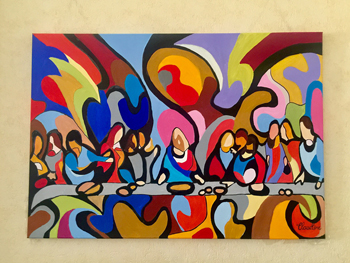For Sunday May 17, 2020
Lectionary Readings (Revised Common Lectionary, Year A)
Acts 17:22-31
Psalm 66:8-20
1 Peter 3:13-22
John 14:15-21
“If you love me,” Jesus tells his disciples in our Gospel reading this week, “you will keep my commandments.” And again: “They who have my commandments and keep them are those who love me.” Love and obedience. According to Jesus, the two are inseparable. We can’t honestly claim to love Jesus if we don’t obey him. Do we really believe this? Do we find it jarring? Is it just me, or are we supposed to find the juxtaposition of love and obedience in this text a bit overwhelming?
I suppose we ought to begin by asking, “What commandments?” What exactly has Jesus commanded us to do? Well, in the chapter directly preceding our lectionary reading, John gives us the answer: “A new command I give you,” Jesus says. “Love one another. As I have loved you, so you must love one another. By this everyone will know that you are my disciples, if you love one another.” In fact, this commandment — Jesus’s “Maundy Thursday” mandate that his disciples love one another — is the only recorded commandment in John’s Gospel. Everything else we say and do as believers in Christ comes down to this. Prayer, evangelism, repentance, generosity, asking, seeking, alms-giving, truth-telling, honoring, serving, feeding, sharing… all of it, in the end, comes down to love. The essential question, the searing question, is this: Do we love one another as Jesus has loved us? Or do we not?
What’s painful about this commandment, of course, is how badly we’ve botched it over the last two thousand years. New Testament scholar D.A Carson names the irony this way: “This new command is simple enough for a toddler to memorize and appreciate, and yet it is profound enough that the most mature believers are repeatedly embarrassed at how poorly they comprehend it and put it into practice.”
When I look at my own life, it’s not too hard to name why I perpetually fail to obey Jesus’s dying wish. Love is vulnerable-making, and I’d rather not be vulnerable. Love requires trust, and I’m naturally suspicious. Love spills over margins and boundaries, and I feel safer and holier policing my borders. Love takes time, effort, discipline, and transformation, and I am just so darned busy.
 |
But Jesus didn’t say, “This is my suggestion.” He said, “This is my commandment.” Meaning, it’s not a choice. It’s not a matter of personal preference; it’s a matter of obedience to the one we call our Lord.
Maybe now it’s easier to understand why Jesus’s conflation of love and obedience feels so jarring. Essentially, he is commanding us to love other people, whether we want to or not, whether we like them or not, and we are not used to thinking about love in terms of obedience to a command. Can we be ordered to love? Does love obey decrees?
My guess is, most of us would say no. Shaped as we are by Hollywood, by romance novels, by Valentine’s Day sentimentality, we tend to think of love as spontaneous and free-flowing. We fall in love. Love is blind, it happens at first sight, it breaks our hearts, its course never runs smooth, etc. etc. etc. Real love, many of us might say, has nothing to do with calculated obedience. Real love is an emotion. A feeling.
In one sense, our instincts are correct; authentic love can’t be manipulated, simulated, or rushed without suffering distortion. Those of us who have children understand full well that “commanding” our bickering kids to love each other doesn't work. The most we can do is insist that our children behave as if they love each other: “Share your toys.” “Say sorry.” “Don’t hit.” “Use kind words.”
But these actions — often performed with gritted teeth and rolling eyes — aren’t the same as what Jesus is talking about in John’s Gospel. Jesus doesn’t stop at saying, “Act as if you love.” He doesn’t give his disciples (or us) the easy “out” of doing nice things with clenched or indifferent hearts. (Nor would I want him to; nothing feels as hollow as a “loving” act performed mechanically. Moreover, I doubt that the people who flocked to Jesus would have done so if they sensed that his compassion was thin or forced.) He says, “Love one another as I have loved you.” As in, for real. As in, the whole bona fide package. Authentic feeling, honest engagement, generous action.
Honestly, doesn’t it sound like Jesus is asking for the impossible? At the same time, though, don’t you yearn for what he’s describing? Imagine what would happen to us, to the Church, and to the world, if we took this commandment of Jesus’s seriously? What could Christendom look like if we obeyed orders and cultivated this “impossible” love?
 |
I ask these questions fearfully, because I don’t always know how to answer them, even for myself. I mean, I know fairly well how to do “love-y” things. How to act “as if.” And maybe that’s a valuable way to begin. I know how to make care packages for the homeless. Or bring dessert to the church potluck. Or send checks to my favorite charities. But do I know how to love as Jesus loved? To feel a depth of compassion that’s gut-punching? To experience a hunger for justice so fierce and so urgent that I rearrange my life in order to pursue it? To empathize until my heart breaks? Do I want to?
Most of the time — I’ll be honest — I don’t. I want to be safe. I want to keep my circle of affection small and manageable. I want to choose the people I love based on my own affinities and preferences — not on Jesus’s all-inclusive commandment. Charitable actions are easy. But cultivating my heart? Preparing and pruning it to love? Becoming vulnerable in authentic ways to the world’s pain? Those things are hard. Hard and costly. And yet Jesus’s words in this Gospel are crystal clear. It is NOT sufficient (or even meaningful) to profess love for Jesus while we hold ourselves apart from our fellow human beings. To love Jesus is to love others. All others. The lover, the friend, the neighbor, the companion. But also the alien, the stranger, the misfit, and the enemy. The ones with whom we agree, and the ones with whom we emphatically disagree. The ones we naturally like, and the ones we don’t.
If our lectionary this week ended with Jesus’s call to obedience, I would despair, but mercifully, there’s more to the story. We don’t have to love all by ourselves. We don’t have to do the impossible on our own. Jesus’s desire is not that we wear ourselves out, trying to conjure love from our own meager resources. Rather, his commandment is accompanied by a promise: “I will ask the Father, and he will give you another Advocate, to be with you forever.”
 |
The Advocate is God’s own Spirit, God’s own heart, living within us. This Spirit, Jesus promises us, will be in us, making possible the startling, counter-intuitive obedience which is love. This Spirit will abide within and among us, creating holy places where authentic, self-sacrificial human love can take root and flourish. The Spirit’s resources are inexhaustible. Long after our natural stores are depleted, the Spirit of God will love in, among, and through us.
As is so often the case in our lives as Christians, Jesus’s commandment leads us straight to paradox: we are called to action via rest. Called to give the love we receive. Called to become the beloved children we are. The commandment — or better yet, the invitation — is to drink our fill of the Source, spill over to bless the world, and then return to the Source for a fresh in-filling. This is our movement, our rhythm, our dance. Over and over again. This is where we begin and end and begin again.
Love me by keeping my commandments, Jesus says. These are finally not two separate actions. They are one and the same. We love because we are loved. We obey Christ because we are in Christ. The love we are commanded to share is the love we are endlessly given. “You in me, and I in you.” The definition of love.
Debie Thomas: debie.thomas1@gmail.com
Image credits: (1) Touchtalent.com; (2) The Artists of Texas; and (3) Behance.net.



